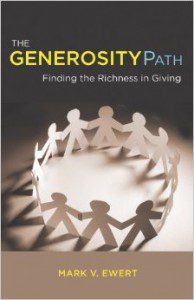The Jewish tradition, with its tremendous respect for all we have inherited from previous generations, reminds us that we often find ourselves “living in houses which we did not build, drinking from wells which we did not dig, and eating from trees which we did not plant.” In that spirit, I invite you to take a few moments to recall:
a time when someone offered you tremendous generosity. It could have been a gift of time, intelligence, money, caring, or simply presence. Remember who that person was and what they gave you with as much detail as you can. Remember how you experienced that event and how it affected you afterward. (Ewert 204)
From family and friends, to teachers and camp counselors, to even random strangers, most of us have been the beneficiaries of tremendous generosity at various points in our lives. Sometimes we have the opportunity to pay these generous givers back in kind. More often, our invitation is to “pay it forward” to others: to both literally and metaphorically build houses in which others will live, dig wells from which others will drink, and to help plant trees from which others will eat.
Likewise, I invite you to recall a time (or times) when you made a memorable gift or donation to an organization about which you feel passionate. Again, in addition to money, what may come to mind is a generosity of time, intelligence, caring, or presence.
This post is inspired by a new book by Mark Ewert titled The Generosity Path. And he has a moving and  meaningful opening activity that he recommends for small groups reflecting on the practice of generosity. Since we are not together in a small group, I invite you to imagine what it might feel like to take out your wallet (or whatever you carry your money or charge cards in) and pass it to a person sitting on your left. And then to pass it to the left again. Next, Mark invites small groups to sit with the other’s wallet for a few minutes. Afterwards, he invites everyone to go around the room and share what it feels like to hold someone else’s wallet or to have your wallet held by someone else.
meaningful opening activity that he recommends for small groups reflecting on the practice of generosity. Since we are not together in a small group, I invite you to imagine what it might feel like to take out your wallet (or whatever you carry your money or charge cards in) and pass it to a person sitting on your left. And then to pass it to the left again. Next, Mark invites small groups to sit with the other’s wallet for a few minutes. Afterwards, he invites everyone to go around the room and share what it feels like to hold someone else’s wallet or to have your wallet held by someone else.
There are such complex personal experiences and social histories behind the various ways each of us think and behave about money. And too often messages around money are guilt- or fear-based. But the invitation to walk the generosity path is to increasingly approach money from a place of inner freedom and abundance.
From the Buddhist tradition Lama Surya Das writes that, “Giving brings happiness at every stage of its expression. We experience joy in forming the intention to be generous; we experience joy in the actual act of giving something; and we experience joy in remembering the fact we have given” (xvii).
Similarly, from the Christian tradition, Henri Nouwen writes, “Every time I take step in the direction of generosity, I know that I am moving from fear to love” (xviii).
Or from modern science,
Research from the University of British Columbia and Harvard Business School shows that spending money on someone else — as little as $5 a day — can significantly boost your happiness. Students who practiced random acts of kindness were significantly happier than those who were not given this task. In another study, college students were given money and directed to either spend it on themselves or spend it pro-socially (on activities meant to benefit other people). Participants who spent it pro-socially were happier at the end of the day than those who spent it on themselves. (2)
From a Unitarian Universalist perspective, one can attribute these findings to the fact that whereas scarcity-thinking leaves us isolated and alone, generosity makes us more aware in a positive way of our connection to the “interdependent web of all existence.”
Along these lines, if you are a looking for a great resource on having honest conversations about money and generosity with your children or grandchildren, I also highly recommend the new book by the New York Times “Your Money” columnist Ron Lieber titled The Opposite of Spoiled: Raising Kids Who Are Grounded, Generous, and Smart About Money.
And when we think of some of the most generous givers in history, one word that comes to mind is philanthropy from the Greek words for “Lover of humanity” (xvi). That etymology is at the core of what many religious progressives aspire to. To use my own tradition of Unitarian Universalism as an example, we sometimes speak of ourselves as theologically liberal religion in the best sense of that word liberal: open to new ideas, generous, open-handed, open-hearted, and open-minded.
Accordingly, the UU Seven Principles include tremendously high aspirations of philanthropy: recognition of the “The inherent worth and dignity of every person,” seeking to create “Justice, equity and compassion in human relations,” and “The goal of world community with peace, liberty, and justice for all.” And one of the first steps we can take to help “build the world dream about” is a personal commitment to take the next step — whatever that looks like for us individually and collectively — on the path toward greater generosity. That might look like a generosity of money, but it may also look like a generosity of time, intelligence, caring, or simply presence.
Ewert also emphasizes that the other side of the generosity path: there are seasons in our life when our invitation is to allow ourselves to receive. Using the acronym HALT — which stands for Hungry, Angry, Lonely, or Tired — he writes that it is difficult to be generous if you are Hungry, Angry, Lonely, or Tired. So if that is the case, your invitation is to stop — to “HALT” — and take care of yourself (58).
Earlier, I invited you to consider a time when someone offered you tremendous generosity as well as a time when you made a memorable gift or donation to an organization about which you feel passionate. Looking to the future, what are you passionate about in this season of your life? What gifts of time, intelligence, caring, or simply presence do you have to share? Instead of paying someone back for generosity in the past, what might you be called to ‘pay forward’ to someone else?
A mentor once told me that, “Generosity is the beginning of wisdom.” The prefix of the word generous means “birth,” as in the word generative (1-2). I took him to mean that generosity invites us to share our gifts and our self with the world. That’s what moving along the Generosity Path looks like.
As I once heard a speaker say, many organizations that work for social change make a mistake in calling themselves non-profits. We need to start seeing ourselves as a “social profit” organization. We invite you to invest your money, time, and energy in progressive religious communities because we bring social profit to communities for building a better world based on connection, compassion, diversity, and justice. And we have the potential to do so much more beyond the significant work already being done.
Along these lines, related to the various communities in which you are involved, I invite you to consider your responses to what author Peter Block calls “powerful questions”:
- What gifts [of time, intelligence, money, caring, or simply presence] do you hold that you are willing to bring to this community?
- What is the commitment that you bring?
- How valuable do we want your involvement to be?
- How valuable an experience do you plan for [your involvement] to be?
For now, I’ll conclude with the following words adapted from a congregational pledge that invites us to reflect on how each one of us contributes to building the Beloved Community:
My congregation is composed of people like me. I help make it what it is.
It will be friendly, if I am.
It will be kind, forgiving, and welcoming, if I am.
Its seats will be filled if I help fill them.
It will do great work, if I work.
It will make generous gifts to many causes, if I am a generous giver.
It will bring others into its worship, if I invite them and bring them.
It will be a congregation of loyalty and love, of fearlessness and faith, of compassion, charity and mercy, if I who make it what it is, am filled with these things.
Therefore, I dedicate myself to the task of being all things that I want my spiritual home to be.
May we each continue on the path toward ever-greater generosity of heart, generosity of mind, generosity of wealth, and generosity of spirit.
The Rev. Dr. Carl Gregg is a trained spiritual director, a D.Min. graduate of San Francisco Theological Seminary, and the minister of the Unitarian Universalist Congregation of Frederick, Maryland. Follow him on Facebook (facebook.com/carlgregg) and Twitter (@carlgregg).
Learn more about Unitarian Universalism:
http://www.uua.org/beliefs/principles
















